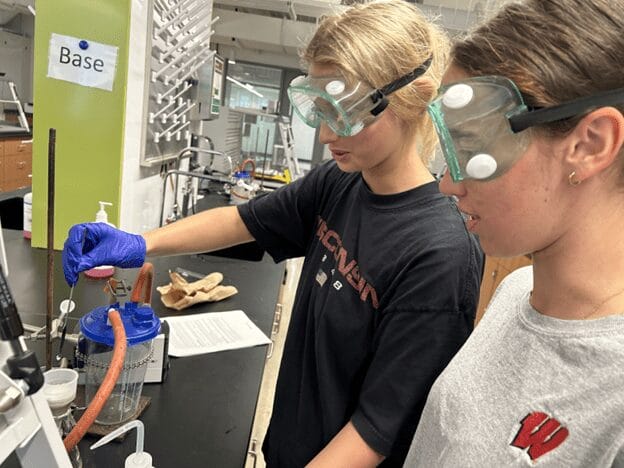

Conquering chemistry in the summer
Chemistry courses have consistently been popular for students to take during Summer Term.
As summer wraps up, we talked with two students taking CHEM 104: General Chemistry II and learned about their experiences, tips and plans for the future.
Both Zoe Nazario and Julia Tsarovsky are rising juniors from Madison. Zoe is on the pre-dental track, majoring in biology and psychology. Julia is majoring in psychology and Spanish on the pre-med track. Required for most STEM majors, Chemistry 104 is a gateway course connecting ideas between general chemistry and organic chemistry.
I’m also currently taking Chemistry 104, so I will share some insights and tips for succeeding in this course (and other summer courses)!
Connecting concepts to the real world
Zoe is taking Chemistry 104 in the summer so she can take higher-level chemistry courses in the fall. Julia wants to free up her schedule next semester. Since chemistry can be a difficult subject, focusing on it in the summer can be crucial to mastering it.
Despite being challenging, Chemistry 104 keeps students engaged with interesting topics. Zoe’s favorite part is learning about and drawing different functional groups – special sets of building blocks that can change how a molecule behaves.
Imagine you have a toy car and add accessories like a spoiler or headlights. Each accessory changes the car in a specific way. A functional group is a specific cluster of atoms within a molecule that gives the molecule certain properties and behaviors. For example, adding an “OH” group (called a hydroxyl group) to a molecule makes it behave like an alcohol.


These groups help scientists predict how molecules will react and interact with each other.
Julia likes learning about different molecular structures, why they vary and how these differences make up common objects that we see in the world. “It’s interesting to understand how objects are constructed and why there are different materials with different abilities to act in a certain way,” Julia said.
Chemistry helps explain everything from a cake – heat causing chemical reactions between ingredients like baking powder and sugar – to batteries, producing electricity through chemical reactions inside battery cells.
Chemistry 104 also features a lab, generally conducted twice a week during the summer. “I like the lab portion of chemistry, although it can be really challenging. It helps you better understand the content and is a good resource,” Zoe said. Julia enjoys labs because they help her visualize content taught in lectures and how it connects to real life.
For example, “One interesting experiment we did was making a solution and identifying what it was by smelling it and comparing it to other solutions to reveal what the product of the reaction was. It was fun and engaging,” Julia added.
The lab helped me connect course concepts with hands-on activities that are common in not only the world of chemistry but also everyday life. For example, one experiment consisted of synthesizing biodiesel and testing its effectiveness by measuring its pH level.
We all agree our chemistry course equips us for the future.
Zoe and Julia said they developed important skills in this summer course. Julia honed her teamwork skills during labs, which will help her pursue her goals in the medical field. Zoe has developed problem-solving skills as well as a knowledge base for scientific skills, which will be important to her in the dental field. “Understanding basic chemistry concepts can help students understand everything else that is taught,” she said.
Tips to succeed
The summer chemistry course workload can be overwhelming, as the course is condensed into eight weeks, resulting in shorter deadlines and more frequent exams. Lecture and discussion sessions last about three hours.


And chemistry course content is rigorous, involving topics like thermodynamics, the science of energy flow and transformation, revealing how heat and work drive everything from engines to weather patterns.
Plus, students have a lot to juggle in the summer. Julia and Zoe both share good tips to help students succeed.
“I think having good time management and setting specific time aside to study is a good way to succeed in summer courses, which can be hard but worth it,” Zoe said. Julia recommends starting homework earlier in the day to free up time later.
Additionally, “Take advantage of smaller courses by using your teaching assistants more,” she said. Teaching assistants are a great resource, she added, as they can clarify the concept or specific step in a problem. Zoe noted that watching explanatory videos outside of class helped her better understand the content.
In addition to the accessibility of teaching assistants, I find the course provides valuable resources for students when it comes to studying for exams, and these resources help me to understand course material after lectures and discussions.
I would also tell students to start studying early in order to understand lectures. In chemistry, all concepts are connected, so learning why different concepts are important has helped me excel in the course.
Julia added, “I would advise students to meet other students to study with, another way to take advantage of smaller classes.”
Chemistry for your career
Although it’s a time-consuming course, Zoe, Julia and I have had a great summer so far!
Zoe works two jobs at her apartment building as well as at an exercise studio. Julia hangs out with friends and enjoys outdoor activities. She volunteers once a week at the UW Health American Family Children’s Hospital. I keep busy life guarding, DJing and enjoying summer activities.
Since Julia and Zoe plan on attending graduate school, taking necessary courses to succeed early on will help them stay on track. “[The summer] can be a time to take a harder class and focus on it completely, making it easier to do well in the class and truly learn the material,” Julia said.
And don’t forget, chemistry can be a lucrative career.
“Chemistry degree holders work in industry, academia and in other fields such as legal, governmental and more. It’s a super versatile degree!” says Kimberly Hazen, marketing and communications manager in the Department of Chemistry.
I am currently studying environmental science and economics, and hope to get an internship with the Department of Natural Resources or do lab work in the field. Having a deep understanding of fundamental chemistry will help me in my career.
Chemistry, by the numbers
- ~470 students enrolled in chemistry courses for Summer Term 2024.
- 7 chemistry courses are offered this summer. CHEM 343 and 345 Organic Chemistry I & II are offered online only to allow students to study wherever they spend the summer.
- All chemistry summer courses are offered during the 8-week summer session. Students also do chemistry research over the summer, either enrolled for research credit, volunteering or on scholarships. Those students are not constrained to the 8-week term.
- Over the course of a year, chemistry hosts 12,000-13,000 undergraduate enrollments, and more than half of UW–Madison students take a chemistry course during their time in Madison.
Learn more about UW–Madison Summer Term. Share your Summer Term story. Tag @uwsummer and #MyBadgerSummer on Instagram and show us what you’re up to this summer.
Published on Jul 29 2024
Last Updated on May 29 2025
Categories: Student stories, Summer Term
Tags: courses, natural, physical & mathmatical sciences, resources and tips
Previous Post
Students use scholarships for valuable internships
